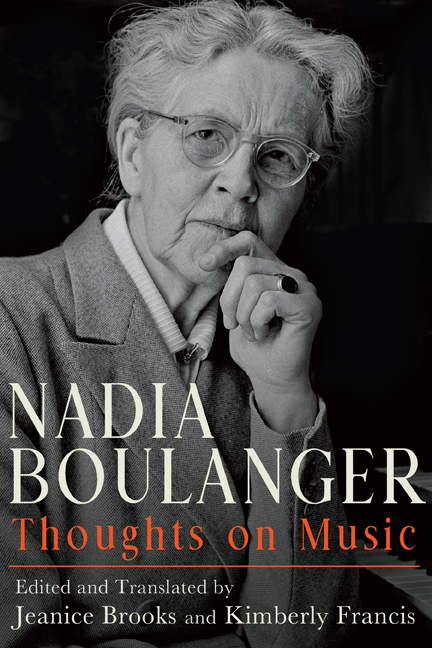Book contents
- Frontmatter
- Contents
- List of Illustrations
- Acknowledgments
- Editorial Apparatus and Critical Notes
- Note on Translations
- List of Abbreviations
- Timeline of Nadia Boulanger’s Life
- Introduction
- Part One Journalism, Criticism, Tributes
- Part Two Lectures, Classes, Broadcasts
- Bibliography of Nadia Boulanger’s Published Writing
- General Bibliography
- Index
Introduction
Published online by Cambridge University Press: 15 October 2020
- Frontmatter
- Contents
- List of Illustrations
- Acknowledgments
- Editorial Apparatus and Critical Notes
- Note on Translations
- List of Abbreviations
- Timeline of Nadia Boulanger’s Life
- Introduction
- Part One Journalism, Criticism, Tributes
- Part Two Lectures, Classes, Broadcasts
- Bibliography of Nadia Boulanger’s Published Writing
- General Bibliography
- Index
Summary
Thinking about Music: Boulanger's Pensées
Nadia Boulanger's significance to twentieth-century musical culture was both multifaceted and profound. During a career spanning over seventy years, her achievements as composer, performer, conductor, impresario and pedagogue brought her into the international spotlight; her legacy remains a topic of keen debate today. This edition brings together selections from Boulanger's published journalism, her published and unpublished tributes to fellow musicians, and published transcripts and unpublished scripts for some of her courses, lectures, and broadcasts, presenting the voice of an extraordinary musical personality.
Boulanger's networks included the most prominent musicians of her time: born in 1887 to a professional musical family in Paris, she knew composers such as Jules Massenet and Claude Debussy during her youth, was a classmate of Maurice Ravel at the Paris Conservatoire, and became a friend and close professional collaborator to Francis Poulenc and Igor Stravinsky. Her own professional career began brilliantly, despite the considerable obstacles she faced as a female artist. In 1904, aged only sixteen, she completed her studies at the Paris Conservatoire with a stunning five first prizes (solfege in 1898; harmony in 1903; and organ, accompaniment, and counterpoint and fugue in 1904). She followed this success by winning the highly prestigious Second Grand Prix in the 1908 Prix de Rome competition. By September 1913, her music was being programmed in leading Parisian venues, and plans were underway with the Opera Comique for the premiere of her opera, La Ville morte, co-written with her partner, internationally renowned concert pianist Raoul Pugno. Pugno's death in January 1914 was a significant emotional and professional blow, and the outbreak of the First World War eight months later definitively scuppered the planned premiere. As the war drew to a close, her sister Lili Boulanger's death in March 1918 further devastated Nadia's world. Although she continued to write new music for several years after the war, both financial constraints and psychological struggles affected her ability to make a career as a composer. An attempt to negotiate a contract with the Ricordi publishing house to support her in writing new music failed, and the deep connections of her creative work with both Pugno and her sister proved difficult to overcome.
- Type
- Chapter
- Information
- Nadia BoulangerThoughts on Music, pp. 1 - 68Publisher: Boydell & BrewerPrint publication year: 2020



